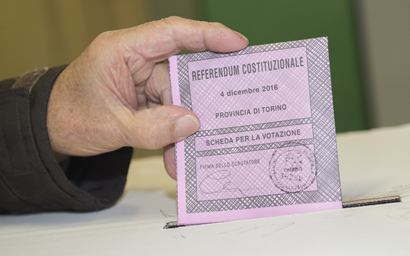Europe will continue to be seen as a high risk market over the next year after the Italian ‘no’ vote in the country’s constitutional reform referendum, it has been warned.
The euro fell to a 20-month low last night in the wake of the vote in Italy’s constitutional reform referendum and Prime Minister Matteo Renzi’s pledge to resign.
The Italian president, Sergio Mattarella, could opt to reject Renzi’s resignation, but if it’s accepted, the president could then move to create a caretaker government, or call a new general election outright.
Michael Metcalfe, global head of macro strategy at State Street Global Markets, said that while the result had long-been priced into Italian equities and bonds, a new election would likely worry markets substantially, given the popularity of anti-EU Five Star Movement in Italy presently.
Nonetheless, Adrian Lowcock, investment director at Architas, said the result is seen as an Italian issue, not a wider Eurozone problem. Nonetheless, he believed Europe would continue to be seen as high-risk by markets over the next year, and he urged investors to be prepared for shocks to the system.
Christophe Bernard, chief strategist at Vontobel, played down fears of a snap general election, as most major parties remain pro-EU and fear the rise of Five Star.
“However, this result and the ensuing political instability will hinder the recapitalisation of Italian banks, and calls into doubt Italy’s ability to reform itself and raise growth, an essential prerequisite for government-debt sustainability. As a consequence, the risk premium assigned to Eurozone assets will remain elevated,” he said.
“Everything else being equal, the result will strengthen the [European Central Bank’s] resolve to err on the side of caution, and extend its current monthly asset-purchasing programme.”
Viktor Nossek, director of research at WisdomTree, said it was a tough day for Italy’s economy – and indeed Europe in general – as Italy’s position within the EU is now threatened.
“At the epicentre are the Italian banks which pose the biggest systemic risks for the Eurozone. We expect investor sentiment to sour and the credit rating agencies to downgrade Italy’s sovereign rating if the stresses on banks intensify, instigating a marked sell off of these debt securities that will put balance sheets under even more pressure than the bad loans are already doing,” he added.
“With unemployment high and labour reforms not going deep enough, it will take years before Italy’s economy meaningfully improves. Italy’s nominal GDP growth must exceed well over 2.5% to outgrow new debt accumulation, assuming state savings remain the same – an outcome that seems challenging due to the vote against the reforms. The no vote will continue to drive bearish sentiment for most Italian asset classes and the Euro.”
The Italian public voted by 60% to 40% to reject Renzi’s proposals to greatly curtail the power of the Italian senate. While polling had widely predicted the result, the margin of victory was wider than expected, and the high turnout of 70% was unforeseen.
Elsewhere in Europe over the weekend, far-right candidate Norbert Hofer lost Austria’s presidential election to Alexander Van der Bellen, former Green party leader.
©2016 funds europe





